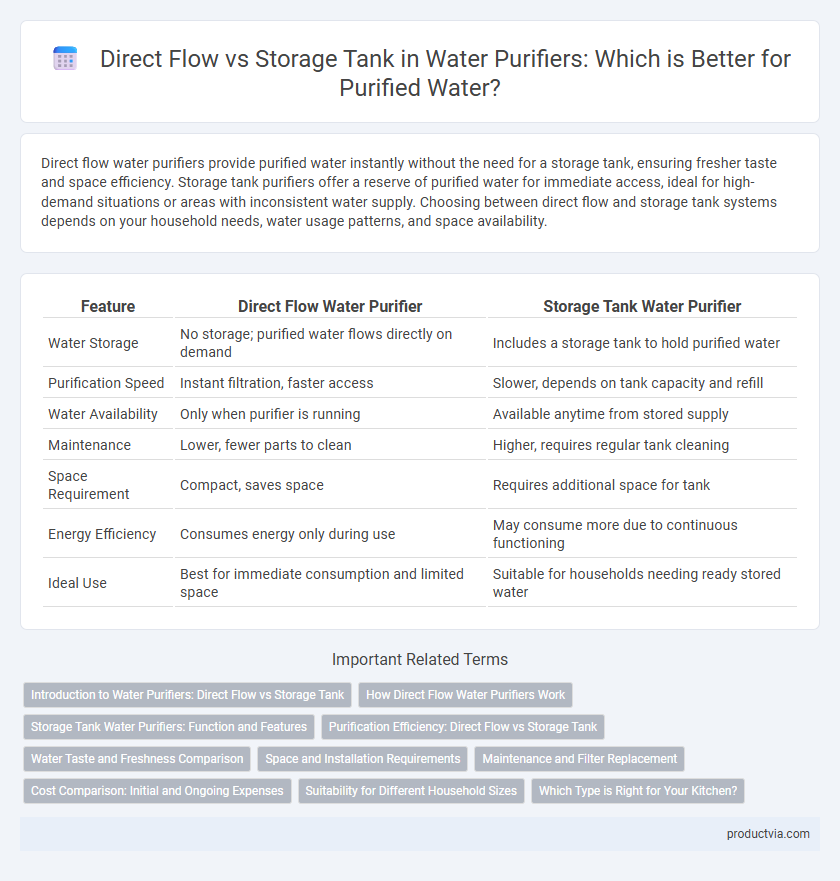Direct flow water purifiers provide purified water instantly without the need for a storage tank, ensuring fresher taste and space efficiency. Storage tank purifiers offer a reserve of purified water for immediate access, ideal for high-demand situations or areas with inconsistent water supply. Choosing between direct flow and storage tank systems depends on your household needs, water usage patterns, and space availability.
Table of Comparison
| Feature | Direct Flow Water Purifier | Storage Tank Water Purifier |
|---|---|---|
| Water Storage | No storage; purified water flows directly on demand | Includes a storage tank to hold purified water |
| Purification Speed | Instant filtration, faster access | Slower, depends on tank capacity and refill |
| Water Availability | Only when purifier is running | Available anytime from stored supply |
| Maintenance | Lower, fewer parts to clean | Higher, requires regular tank cleaning |
| Space Requirement | Compact, saves space | Requires additional space for tank |
| Energy Efficiency | Consumes energy only during use | May consume more due to continuous functioning |
| Ideal Use | Best for immediate consumption and limited space | Suitable for households needing ready stored water |
Introduction to Water Purifiers: Direct Flow vs Storage Tank
Direct flow water purifiers provide instant purified water by filtering it on demand, eliminating the need for a storage tank and ensuring fresher taste. Storage tank water purifiers store a specific volume of purified water, allowing immediate access but requiring regular maintenance to prevent bacterial growth. Choosing between direct flow and storage tank systems depends on water consumption patterns, space availability, and water quality requirements.
How Direct Flow Water Purifiers Work
Direct flow water purifiers use advanced filtration technology that processes water instantly without storing it, ensuring fresh and purified water on demand. These systems typically incorporate multi-stage purification methods such as UV, RO, and activated carbon filters to remove contaminants in real-time. Direct flow purifiers are ideal for areas with consistent water supply, providing hygienic water without the risk of bacterial growth common in storage tanks.
Storage Tank Water Purifiers: Function and Features
Storage tank water purifiers store purified water in a dedicated reservoir, ensuring immediate availability whenever needed. These systems typically include multi-stage filtration processes such as RO, UV, and activated carbon filters, maintaining water quality while allowing for high-volume water storage. Equipped with features like auto shut-off, sediment filters, and antimicrobial coatings, storage tank purifiers offer convenience and consistent supply for households with fluctuating water demand or low water pressure.
Purification Efficiency: Direct Flow vs Storage Tank
Direct Flow water purifiers deliver purified water instantly without storing it, ensuring higher purification efficiency by minimizing chances of microbial growth commonly found in storage tanks. Storage Tank purifiers may occasionally harbor contaminant buildup over time, reducing overall water quality despite initial purification. The choice impacts water freshness and safety, with Direct Flow systems emphasizing immediate, high-efficiency purification processes.
Water Taste and Freshness Comparison
Direct flow water purifiers deliver purified water instantly, preserving natural freshness and taste by minimizing water retention time. Storage tank models may cause slight taste alterations due to water sitting for extended periods, potentially affecting freshness. Consumers seeking crisp, fresh-tasting water often prefer direct flow systems for their immediate dispensing capabilities.
Space and Installation Requirements
Direct flow water purifiers offer compact designs that save space by eliminating bulky storage tanks, making them ideal for small kitchens or limited countertop areas. Storage tank purifiers require additional installation space and plumbing to accommodate the tank, which can be challenging in tight spaces. Choosing direct flow systems reduces installation complexity and ensures a streamlined setup without compromising purified water availability.
Maintenance and Filter Replacement
Direct flow water purifiers require more frequent filter replacement since water passes through the filtration system on demand, increasing wear on filters. Storage tank purifiers need less regular filter changes, but their tanks require periodic cleaning to prevent bacterial buildup and maintain water quality. Regular maintenance schedules for both systems are essential to ensure optimal purification performance and safe drinking water.
Cost Comparison: Initial and Ongoing Expenses
Direct flow water purifiers typically have a lower initial cost compared to storage tank models due to their compact design and fewer components. Ongoing expenses for direct flow systems often include higher electricity usage and more frequent filter replacements, whereas storage tank purifiers may incur additional costs for tank maintenance and larger filter cartridges. Choosing between the two depends on budget priorities, as direct flow units save upfront costs but storage tanks may offer cost efficiency over time through less frequent servicing.
Suitability for Different Household Sizes
Direct flow water purifiers provide on-demand purified water suitable for small to medium households due to their compact design and instant filtration capabilities. Storage tank purifiers are ideal for larger families, offering a ready supply of purified water and ensuring availability during power outages or high consumption periods. Choosing between the two depends on daily water consumption, space availability, and household size.
Which Type is Right for Your Kitchen?
Direct flow water purifiers provide purified water on demand without the need for storage tanks, making them ideal for kitchens with limited space and consistent water supply. Storage tank purifiers store a reserve of purified water, ensuring availability during power cuts or water outages, suitable for areas with irregular water flow. Choosing the right type depends on your kitchen layout, water usage frequency, and reliability of your water source.
Direct Flow vs Storage Tank for purified water Infographic

 productvia.com
productvia.com